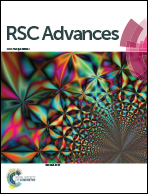Asymmetric organic carbonate synthesis catalyzed by an enzyme with dimethyl carbonate: a fruitful sustainable alliance†
Abstract
We have successfully developed an easy and efficient bioprocess for asymmetric organic carbonate synthesis by performing Novozym 435 mediated esterification of DMC and alcohols in this work. Under the optimized conditions (60 °C, molar ratio of alcohol to DMC 1 : 12), the highest yield of carbonate can reach 95.6%. An additional advantage of the new process is the fact that 90% of the original activity of the enzyme is retained after being recycled nine times. Consequently it has potential as a useful enzyme-catalyzed process for the industrial production of asymmetric organic carbonates.


 Please wait while we load your content...
Please wait while we load your content...